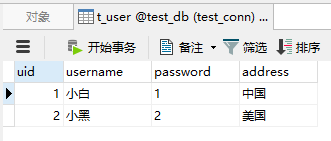SSM框架整合过程总结
-----------------------siwuxie095
SSM 框架整合过程总结
1、导入相关 jar 包(共 26 个)
(1)导入 Spring 的核心 jar 包和日志相关的 jar 包(6 个)

Commons Logging 下载链接:
http://commons.apache.org/proper/commons-logging/download_logging.cgi
LOG4J 下载链接:
https://www.apache.org/dist/logging/log4j/
(2)导入 Spring 的 AOP 开发的 jar 包(4 个)

AOP Alliance 下载链接:
http://mvnrepository.com/artifact/aopalliance/aopalliance
AspectJ Weaver 下载链接:
http://mvnrepository.com/artifact/org.aspectj/aspectjweaver
(3)导入 Spring 的 JDBC 开发的 jar 包(2 个)

(4)导入 Spring 整合 Web 项目的 jar 包(1 个)

(5)导入 SpringMVC 的 jar 包(1 个)

(6)导入 SpringMVC 中使用 JSON 所需的 jar 包(3 个)

Jackson Core 下载链接:
http://repo1.maven.org/maven2/com/fasterxml/jackson/core/jackson-core/
Jackson Annotations 下载链接:
http://repo1.maven.org/maven2/com/fasterxml/jackson/core/jackson-annotations/
Jackson Databind 下载链接:
http://repo1.maven.org/maven2/com/fasterxml/jackson/core/jackson-databind/
(7)导入 MyBatis 的 jar 包(1 个)

(8)导入 MyBatis 所需的日志相关的 jar 包(2 个)

「MyBatis 也需要 LOG4J,但前面 Spring 已导入,不再重复导入」
(9)导入 MyBatis 分页相关的 jar 包(2 个)

PageHelper 下载链接:
http://repo1.maven.org/maven2/com/github/pagehelper/pagehelper/
JSqlParser 下载链接:
http://repo1.maven.org/maven2/com/github/jsqlparser/jsqlparser/0.9.5/
(10)导入 MySQL 的 JDBC 驱动的 jar 包(1 个)

MySQL Connector/J 下载链接:
https://dev.mysql.com/downloads/connector/j/
(11)导入 Spring 整合 MyBatis 的 jar 包(1 个)

MyBatis-Spring 下载链接:
https://github.com/mybatis/spring/releases
(12)导入 BoneCP 的 jar 包和其依赖的 Guava 的 jar 包(2 个)

BoneCP 下载链接:
http://repo1.maven.org/maven2/com/jolbox/bonecp/
Guava 下载链接:
http://repo1.maven.org/maven2/com/google/guava/guava/
2、创建数据库和表
创建数据库 test_db, 再创建表 t_user,并插入若干数据,
其中:uid 为主键,且为自动增长

3、测试
(1)编写一个实体类
User.java:
package com.siwuxie095.entity;
// 实体类 public class User {
private Integer uid; private String username; private String password; private String address;
public Integer getUid() { return uid; } public void setUid(Integer uid) { this.uid = uid; }
public String getUsername() { return username; } public void setUsername(String username) { this.username = username; }
public String getPassword() { return password; } public void setPassword(String password) { this.password = password; }
public String getAddress() { return address; } public void setAddress(String address) { this.address = address; }
@Override public String toString() { return "User [uid=" + uid + ", username=" + username + ", password=" + password + ", address=" + address + "]"; }
} |
(2)编写一个 Controller 类
UserController.java:
package com.siwuxie095.controller;
import org.springframework.http.HttpStatus; import org.springframework.stereotype.Controller; import org.springframework.web.bind.annotation.RequestMapping; import org.springframework.web.bind.annotation.ResponseStatus;
import com.siwuxie095.entity.User; import com.siwuxie095.service.UserService;
// Controller 类 @Controller @RequestMapping("/user") public class UserController {
private UserService userService;
public void setUserService(UserService userService) { this.userService = userService; }
/** * 注意:这里没有返回值,仅仅返回了一个 HTTP 状态码 200 */ @RequestMapping("/show") @ResponseStatus(HttpStatus.OK) public void show() {
User user = userService.getUser(1); System.out.println(user); }
} |
(3)编写一个 Service 类
UserService.java:
package com.siwuxie095.service;
import org.springframework.transaction.annotation.Transactional;
import com.siwuxie095.entity.User; import com.siwuxie095.mapper.UserMapper;
// Service 类 @Transactional public class UserService {
private UserMapper userMapper;
public void setUserMapper(UserMapper userMapper) { this.userMapper = userMapper; }
public User getUser(Integer uid){ return userMapper.getUser(uid); }
} |
(4)编写一个映射器接口
UserMapper.java:
package com.siwuxie095.mapper;
import org.apache.ibatis.annotations.Param;
import com.siwuxie095.entity.User;
// 映射器接口 public interface UserMapper {
User getUser(@Param("uid") Integer uid);
} |
(5)在 MyBatis 映射配置文件中进行配置
UserMapper.xml:
<?xml version="1.0" encoding="UTF-8" ?> <!DOCTYPE mapper PUBLIC "-//mybatis.org//DTD Mapper 3.0//EN" "http://mybatis.org/dtd/mybatis-3-mapper.dtd">
<mapper namespace="com.siwuxie095.mapper.UserMapper">
<select id="getUser" resultType="User"> select * from t_user where uid = #{uid} </select>
</mapper> |
(6)在 MyBatis 核心配置文件中进行配置
mybatis-config.xml:
<?xml version="1.0" encoding="UTF-8" ?> <!DOCTYPE configuration PUBLIC "-//mybatis.org//DTD Config 3.0//EN" "http://mybatis.org/dtd/mybatis-3-config.dtd">
<configuration>
<settings> <!-- 开启自动驼峰命名规则映射 --> <setting name="mapUnderscoreToCamelCase" value="true"/> </settings>
<!-- 配置类型别名 --> <typeAliases> <typeAlias type="com.siwuxie095.entity.User" alias="User"/> </typeAliases>
<!-- 引入映射配置文件 --> <mappers> <package name="com.siwuxie095.mapper"/> </mappers>
</configuration> |
(7)在数据库连接信息的属性文件中进行配置
jdbc.properties:
jdbc.driverClassName=com.mysql.jdbc.Driver
jdbc.url=jdbc:mysql:///test_db
jdbc.username=root
jdbc.password=8888 |
其中:
jdbc:mysql:///test_db 是 jdbc:mysql://localhost:3306/test_db 的简写
(8)在 Spring 核心配置文件中进行配置
applicationContext.xml:
<?xml version="1.0" encoding="UTF-8"?> <beans xmlns="http://www.springframework.org/schema/beans" xmlns:xsi="http://www.w3.org/2001/XMLSchema-instance" xmlns:aop="http://www.springframework.org/schema/aop" xmlns:context="http://www.springframework.org/schema/context" xmlns:tx="http://www.springframework.org/schema/tx" xsi:schemaLocation=" http://www.springframework.org/schema/beans http://www.springframework.org/schema/beans/spring-beans.xsd http://www.springframework.org/schema/aop http://www.springframework.org/schema/aop/spring-aop.xsd http://www.springframework.org/schema/context http://www.springframework.org/schema/context/spring-context.xsd http://www.springframework.org/schema/tx http://www.springframework.org/schema/tx/spring-tx.xsd">
<!-- 使用spring自带的占位符替换功能 --> <bean class="org.springframework.beans.factory.config.PropertyPlaceholderConfigurer">
<!-- 允许JVM参数覆盖 --> <property name="systemPropertiesModeName" value="SYSTEM_PROPERTIES_MODE_OVERRIDE"/>
<!-- 忽略没有找到的资源文件 --> <property name="ignoreResourceNotFound" value="true"/>
<!-- 配置资源文件(也称 外部属性文件) --> <property name="locations"> <list> <value>classpath:jdbc.properties</value> </list> </property>
</bean>
<!-- 配置 BoneCP 连接池 --> <bean id="dataSource" class="com.jolbox.bonecp.BoneCPDataSource" destroy-method="close">
<!-- 数据库驱动 --> <property name="driverClass" value="${jdbc.driverClassName}" />
<!-- 相应驱动的jdbcUrl --> <property name="jdbcUrl" value="${jdbc.url}" />
<!-- 数据库的用户名 --> <property name="username" value="${jdbc.username}" />
<!-- 数据库的密码 --> <property name="password" value="${jdbc.password}" />
<!-- 检查数据库连接池中空闲连接的间隔时间,单位是分,默认值:240,如果要取消则设置为0 --> <property name="idleConnectionTestPeriod" value="60" />
<!-- 连接池中未使用的链接最大存活时间,单位是分,默认值:60,如果要永远存活设置为0 --> <property name="idleMaxAge" value="30" />
<!-- 每个分区最大的连接数 --> <property name="maxConnectionsPerPartition" value="150" />
<!-- 每个分区最小的连接数 --> <property name="minConnectionsPerPartition" value="5" />
</bean>
<!-- 将 SqlSessionFactory 对象的创建交给 Spring 进行管理 --> <bean id="sqlSessionFactory" class="org.mybatis.spring.SqlSessionFactoryBean"> <!-- 指定数据源 --> <property name="dataSource" ref="dataSource" /> <!-- 指定 MyBatis 核心配置文件的位置(路径) --> <property name="configLocation" value="classpath:mybatis-config.xml"></property> </bean>
<!-- 配置 Service 对象 --> <bean id="userService" class="com.siwuxie095.service.UserService"> <property name="userMapper" ref="userMapper"></property> </bean>
<!-- 配置映射器接口(Mapper 接口)的扫描包 --> <bean class="org.mybatis.spring.mapper.MapperScannerConfigurer"> <!-- 如有多个包,以逗号 或 分号隔开即可 --> <property name="basePackage" value="com.siwuxie095.mapper"/> </bean>
<!-- 配置映射器接口(以下方法二选一即可,这里选择法二):
法一:逐个配置:配置映射器接口(Mapper 接口)的对象
<bean id="userMapper" class="org.mybatis.spring.mapper.MapperFactoryBean"> <property name="mapperInterface" value="com.siwuxie095.mapper.UserMapper"/> <property name="sqlSessionFactory" ref="sqlSessionFactory"/> </bean>
法二:统一配置:配置映射器接口(Mapper 接口)的扫描包
<bean class="org.mybatis.spring.mapper.MapperScannerConfigurer"> <property name="basePackage" value="com.siwuxie095.mapper"/> </bean>
-->
<!-- 配置事务管理器 --> <bean id="transactionManager" class="org.springframework.jdbc.datasource.DataSourceTransactionManager"> <!-- 注入 dataSource --> <property name="dataSource" ref="dataSource" /> </bean>
<!-- 配置事务注解,即 开启事务注解 --> <tx:annotation-driven transaction-manager="transactionManager"/>
<!-- 一般事务管理都是在 Service 层进行,只需在 Service 类上加上 @Transactional 注解 -->
</beans> |
(9)在 SpringMVC 核心配置文件中进行配置
dispatcher-servlet.xml:
<?xml version="1.0" encoding="UTF-8"?> <beans xmlns="http://www.springframework.org/schema/beans" xmlns:xsi="http://www.w3.org/2001/XMLSchema-instance" xmlns:context="http://www.springframework.org/schema/context" xmlns:mvc="http://www.springframework.org/schema/mvc" xsi:schemaLocation=" http://www.springframework.org/schema/beans http://www.springframework.org/schema/beans/spring-beans.xsd http://www.springframework.org/schema/context http://www.springframework.org/schema/context/spring-context.xsd http://www.springframework.org/schema/mvc http://www.springframework.org/schema/mvc/spring-mvc.xsd">
<!-- 启用注解驱动 --> <mvc:annotation-driven/>
<!-- 配置 Controller(必须,即 必须进行配置)
class 为自定义 Controller 类的完全限定名,这里通过 Controller 类中的 @RequestMapping 注解来设置访问路径
使用纯注解时,另一种配置 Controller 的方式:配置扫描包 <context:component-scan base-package="com.siwuxie095.controller" /> --> <bean id="userController" class="com.siwuxie095.controller.UserController"> <property name="userService" ref="userService"/> </bean>
<!-- 配置 ViewResolver(必须,即 必须进行配置) --> <bean class="org.springframework.web.servlet.view.InternalResourceViewResolver"> <!-- 配置视图解析的前缀 prefix 和后缀 suffix: (1)前缀:如果在 WebContent 目录下,则为 /,如果在 WEB-INF 目录下,则为 /WEB-INF/ (2)后缀:一般为 JSP 文件,所以为 .jsp
例如:prefix="/",suffix=".jsp",viewname="test",则:"/test.jsp" --> <property name="prefix" value="/"/> <property name="suffix" value=".jsp"/> </bean>
</beans> |
(10)在部署描述文件中进行配置
web.xml:
<?xml version="1.0" encoding="UTF-8"?> <web-app xmlns:xsi="http://www.w3.org/2001/XMLSchema-instance" xmlns="http://xmlns.jcp.org/xml/ns/javaee" xsi:schemaLocation="http://xmlns.jcp.org/xml/ns/javaee http://xmlns.jcp.org/xml/ns/javaee/web-app_3_1.xsd" version="3.1"> <display-name>TestSpringMVCAndSpring</display-name> <welcome-file-list> <welcome-file>index.html</welcome-file> <welcome-file>index.htm</welcome-file> <welcome-file>index.jsp</welcome-file> <welcome-file>default.html</welcome-file> <welcome-file>default.htm</welcome-file> <welcome-file>default.jsp</welcome-file> </welcome-file-list>
<!-- 配置 Spring 的监听器 ContextLoaderListener --> <listener> <listener-class>org.springframework.web.context.ContextLoaderListener</listener-class> </listener>
<!-- 配置 Spring 核心配置文件的位置(路径) --> <context-param> <param-name>contextConfigLocation</param-name> <param-value>classpath:applicationContext.xml</param-value> </context-param>
<!-- 配置 SpringMVC 的核心分发器 --> <servlet> <servlet-name>dispatcher</servlet-name> <servlet-class>org.springframework.web.servlet.DispatcherServlet</servlet-class> <!-- 配置 SpringMVC 核心配置文件的位置(路径) --> <init-param> <param-name>contextConfigLocation</param-name> <param-value>classpath:dispatcher-servlet.xml</param-value> </init-param> <!-- 自动加载:随 Tomcat 容器启动,完成初始化 --> <load-on-startup>1</load-on-startup> </servlet>
<servlet-mapping> <servlet-name>dispatcher</servlet-name> <url-pattern>*.do</url-pattern> </servlet-mapping>
</web-app> |
(11)访问路径
http://localhost:8080/工程名/user/show.do
附:
另一种配置方式,即 纯注解,对以上「测试」做如下修改:
(1)在 Controller 类中:
1)在 userService 属性上加 @Autowired 注解
2)删掉 userService 属性的 setter 方法
(2)在 Service 类中:
1)在类上加 @Service 注解
2)在 userMapper 属性上加 @Autowired 注解
3)删掉 userMapper 属性的 setter 方法
(3)在 Spring 核心配置文件中:
1)删掉 userService 的 Bean
2)加上 <context:component-scan base-package="com.siwuxie095.service"/>
(4) 在 SpringMVC 核心配置文件中:
1)删掉 userController 的 Bean
2)加上 <context:component-scan base-package="com.siwuxie095.controller"/>
或 综合(3)(4):删掉两个 Bean,在 SpringMVC 核心配置文件中
加上如下内容:
<context:component-scan base-package="com.siwuxie095"/>
【made by siwuxie095】
posted on 2018-03-06 13:44 siwuxie095 阅读(652) 评论(1) 编辑 收藏 举报


